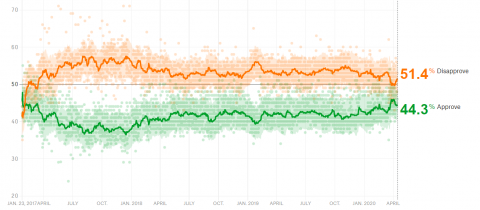


Can and will Joe Biden unite the democrats to take on a faltering Trump?
Contrary to expectations of a bitter, drawn out primary battle amongst Democrats, Biden united the Democratic Party this week and secured his position as the presumptive Democratic nominee for President. Receiving impassioned endorsements from his former rivals, Bernie Sanders and Elizabeth Warren, and the backing of former President Barack Obama, Biden has wrapped up the Democratic nomination earlier than any nominee since 2004.
Biden’s nomination presents both an opportunity and challenge for Democrats. Biden has been financially challenged to date, raising far less than other Democrats who competed for the nomination. It did not impede his ultimate ability to secure the nomination, but Biden will need to work in the coming weeks to grow his own small dollar donor network that was so successful for candidates like Bernie Sanders and Elizabeth Warren. While Democrats faced a competitive primary, Donald Trump was able to build a historic fundraising advantage. So while all eyes – and minds – are on the public health crisis enveloping the country, Biden will need to use this period to raise the critical funds needed to take on Trump this fall.
Fundraising challenges aside, Biden heads into the general election with one of the broadest Electoral College opportunities for Democrats in the past decade. Much of the 2016 election focused on the Upper Midwest, and states like Michigan, Wisconsin and Pennsylvania continue to look like tipping point states this year. But Biden’s candidacy also presents an opportunity to put states like Arizona in play, where a Democrat hasn’t won since 1996, as well as North Carolina and Florida, which Hillary Clinton contested but was unable to win against Donald Trump last cycle.
As the general election picture becomes clear, what is less clear is exactly how this campaign will play out under the coronavirus health crisis and subsequent economic collapse. Even as tens of thousands of Americans have died and tens of millions are out of work, in the early days of this crisis Trump experienced a bump in his popularity. As in other times of crisis that have gripped our nation, Trump benefited from a rally around the flag effect in response to the coronavirus pandemic. Polls taken in late March showed Donald Trump with an improved approval rating, as Americans yearned for someone to lead them through this crisis.

FiveThirtyEight's latest data, however, suggests that Trump's approval rise has not only plateaued, but is falling back to the historic lows that have been a feature of his White House tenure.
As it should: Trump’s refusal to take coronavirus seriously at the beginning of this crisis likely caused thousands of unnecessary deaths. A new epidemiology study reported in The New York Times finds that, if Trump had taken action on social distancing just two weeks earlier than he did, 90% of U.S. coronavirus deaths could have been prevented. Remember, it has now been 50 days since Donald Trump told the American people we’d soon have zero cases in the U.S. As of this week, we now have 644,000+ cases and 28,500+ deaths – more deaths than any other country in the world.
In the 2016 election Donald Trump posed a provocative question to voters: What the hell do you have to lose? Joe Biden now has six months to convince the American people that our health, our jobs, our very lives are worth more than another four years of a recklessly irresponsible Trump presidency.
Matt McDermott is a co-host of The Election Show on MNN, a communications strategist and Vice President at Whitman Insight Strategies, a research consultancy based in New York City. He can be found on Twitter at @mattmfm.